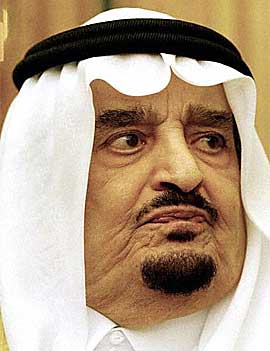Saudi King Fahd dies

Your support helps us to tell the story
From reproductive rights to climate change to Big Tech, The Independent is on the ground when the story is developing. Whether it's investigating the financials of Elon Musk's pro-Trump PAC or producing our latest documentary, 'The A Word', which shines a light on the American women fighting for reproductive rights, we know how important it is to parse out the facts from the messaging.
At such a critical moment in US history, we need reporters on the ground. Your donation allows us to keep sending journalists to speak to both sides of the story.
The Independent is trusted by Americans across the entire political spectrum. And unlike many other quality news outlets, we choose not to lock Americans out of our reporting and analysis with paywalls. We believe quality journalism should be available to everyone, paid for by those who can afford it.
Your support makes all the difference.The king - hereditary sovereign of the oil-rich desert kingdom founded by his father - was immediately succeeded by his half-brother Abdullah, who has effectively been in charge of Saudi Arabia since Fahd was incapacitated by a stroke in 1995.
Spokesmen for the regime insisted that the transfer of power would be handled smoothly, playing down speculation over a possible struggle for the succession among Saudi Arabia's large royal family.
The former defence minister Jonathan Aitken hailed Fahd as a "warm, humorous, loquacious" man who would be remembered as a "great king" in the Arab world.
King Fahd bin Abdul Aziz ascended to the throne of Saudi Arabia on June 13, 1982, having himself served as de facto ruler for more than a decade.
As Crown Prince, he helped oversee the modernisation of Saudi Arabia, driven by massive income from oil in the 1970s. But his reign saw the start of a decline in revenue from fuel which has depressed the incomes of many in the kingdom.
And its latter years were overshadowed by the development of Islamist fundamentalist groups such as the al Qaida network, which have carried out a number of attacks, particularly on foreign interests, in the kingdom.
Fifteen of the 19 hijackers who carried out the September 11 attacks in the US were Saudi citizens.
Fahd was blamed by some observers for fostering Islamic radicalism by making concessions to religious hard-liners from the fundamentalist Wahhabi sect, in the hope of bolstering his image as a pious ruler.
His decision to allow US troops to be based on Saudi soil following Iraq's invasion of Kuwait in 1990 enraged conservatives and provided al Qaida with one of its most potent rallying cries.
Mr Aitken, who dealt with Fahd as defence procurement minister in John Major's administration, told the BBC Radio 4 Today programme: "I have very good memories of him. He was in personal terms a warm, humorous man.
"He was very much a king who ruled. He certainly ran the show. In a way, he was a great king inside Saudi Arabia, because he took the country through this sudden rush of oil money.
"Of course, mistakes were made, but if you look at the big picture, in terms of Saudi Arabia's development, its education, its progress, he was a king who took through the most tremendous advance in any Arab country's history.
"He will be remembered as a great king in the Arab world."
Mr Aitken remembered Fahd as a man who preferred to work at night, conducting lengthy business meetings, peppered with conversation about politics and international affairs, through the small hours.
A statement read out on Saudi television this morning said: "With all sorrow and sadness, the royal court in the name of his highness Crown Prince Abdullah bin Abdul Aziz and all members of the family announces the death of the servant of the two shrines, King Fahd bin Abdul Aziz."
Fahd died early today at the King Faisal Specialist Hospital in the Saudi capital, Riyadh, where he was admitted on May 27 for unspecified medical tests, said an official at the hospital.
Jamal Kashoggi, media adviser to the Saudi embassy in London, said: "The moment the news came through, members of the royal family went immediately to declare their allegiance to the Crown Prince and declare him king.
"The succession is in order and things are going as normal, as we expected them to go.
"Nobody will see a difference. Abdullah has been in charge for the last few years and we don't expect any major change in governance or policy. Things will continue as they have been in the kingdom for the last few years."
Join our commenting forum
Join thought-provoking conversations, follow other Independent readers and see their replies
Comments